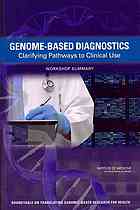

Most ebook files are in PDF format, so you can easily read them using various software such as Foxit Reader or directly on the Google Chrome browser.
Some ebook files are released by publishers in other formats such as .awz, .mobi, .epub, .fb2, etc. You may need to install specific software to read these formats on mobile/PC, such as Calibre.
Please read the tutorial at this link: https://ebookbell.com/faq
We offer FREE conversion to the popular formats you request; however, this may take some time. Therefore, right after payment, please email us, and we will try to provide the service as quickly as possible.
For some exceptional file formats or broken links (if any), please refrain from opening any disputes. Instead, email us first, and we will try to assist within a maximum of 6 hours.
EbookBell Team

4.3
78 reviewsThe sequencing of the human genome and the identification of associations between specific genetic variants and diseases have led to an explosion of genomic-based diagnostic tests. These tests have the potential to direct therapeutic interventions, predict risk or onset of disease, or detect residual disease. As research progresses and an increasing number of associations are found, further tests will be developed that can aid in providing personalized treatment options for patients. However, the adoption of genomic diagnostic tests by health care providers has been limited due to a lack of evidence regarding the clinical utility of many tests. Health funders and practitioners lack the data necessary to distinguish which tests can improve practice or the clinical settings in which tests will provide the greatest value. The Roundtable on Translating Genomic-Based Research for Health held a workshop in November 2010 to determine what evidence is needed and how it is viewed by different stakeholders in order to develop genomic diagnostic tests of clinical value.
Genome-Based Diagnostics summarizes the presentations and discussions that took place throughout the workshop. Two presentations, in particular, sparked extensive discussion. One presentation proposed that all genomic diagnostic tests be reviewed and approved by the Food and Drug Administration. The other observed that venture capitalists are no longer investing substantially in the development of genomic diagnostic tests because of a lack of clarity surrounding regulatory and reimbursement pathways. Both presentations suggested the need for major changes in the systems used to develop, regulate, and reimburse genomic diagnostic tests. The report also presents the perspectives of different stakeholders in the development of genomic diagnostic tests. Each stakeholder group has a different set of needs and issues of importance, yet commonalities among them are apparent, such as the need to put patients and health outcomes at the center of discussion and action.